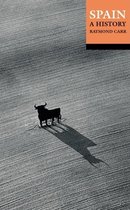The Eve of Spain - Myths of Origins in the History of Christian, Muslim, and Jewish Conflict Myths of Origins in the History of Christian, Muslim, and Jewish Conflict
Afbeeldingen
Sla de afbeeldingen overArtikel vergelijken
Auteur:
Patricia E. Grieve
- Engels
- Hardcover
- 9780801890369
- 15 juni 2009
- 352 pagina's
Samenvatting
Finally, Grieve focuses on the misogynistic elements of the story and asks why the fall of Spain is figured as a cautionary tale about a woman's sexuality.
The Eve of Spain demonstrates how the telling and retelling of one of Spain's founding myths played a central role in the formation of that country's national identity. King Roderigo, the last Visigoth king of Spain, rapes (or possibly seduces) La Cava, the daughter of his friend and counselor, Count Julian. In revenge, the count travels to North Africa and conspires with its Berber rulers to send an invading army into Spain. So begins the Muslim conquest and the end of Visigothic rule. A few years later, in Northern Spain, Pelayo initiates a Christian resistance and starts a new line of kings to which the present-day Spanish monarchy traces its roots. Patricia E. Grieve follows the evolution of this story from the Middle Ages into the modern era, as shifts in religious tolerance and cultural acceptance influenced its retelling. She explains how increasing anti-Semitism came to be woven into the tale during the Christian conquest of the peninsula-in the form of traitorous Jewish conspirators. In the sixteenth century, the tale was linked to the looming threat of the Ottoman Turks. The story continued to resonate through the Enlightenment and into modern historiography, revealing the complex interactions of racial and religious conflict and evolving ideas of women's sexuality. In following the story of La Cava, Rodrigo, and Pelayo, Grieve explains how foundational myths and popular legends articulate struggles for national identity. She explores how myths are developed around few historical facts, how they come to be written into history, and how they are exploited politically, as in the expulsion of the Jews from Spain in 1492 followed by that of the Moriscos in 1609. Finally, Grieve focuses on the misogynistic elements of the story and asks why the fall of Spain is figured as a cautionary tale about a woman's sexuality.
The Eve of Spain demonstrates how the telling and retelling of one of Spain's founding myths played a central role in the formation of that country's national identity. King Roderigo, the last Visigoth king of Spain, rapes (or possibly seduces) La Cava, the daughter of his friend and counselor, Count Julian. In revenge, the count travels to North Africa and conspires with its Berber rulers to send an invading army into Spain. So begins the Muslim conquest and the end of Visigothic rule. A few years later, in Northern Spain, Pelayo initiates a Christian resistance and starts a new line of kings to which the present-day Spanish monarchy traces its roots. Patricia E. Grieve follows the evolution of this story from the Middle Ages into the modern era, as shifts in religious tolerance and cultural acceptance influenced its retelling. She explains how increasing anti-Semitism came to be woven into the tale during the Christian conquest of the peninsula-in the form of traitorous Jewish conspirators. In the sixteenth century, the tale was linked to the looming threat of the Ottoman Turks. The story continued to resonate through the Enlightenment and into modern historiography, revealing the complex interactions of racial and religious conflict and evolving ideas of women's sexuality. In following the story of La Cava, Rodrigo, and Pelayo, Grieve explains how foundational myths and popular legends articulate struggles for national identity. She explores how myths are developed around few historical facts, how they come to be written into history, and how they are exploited politically, as in the expulsion of the Jews from Spain in 1492 followed by that of the Moriscos in 1609. Finally, Grieve focuses on the misogynistic elements of the story and asks why the fall of Spain is figured as a cautionary tale about a woman's sexuality.
Productspecificaties
Wij vonden geen specificaties voor jouw zoekopdracht '{SEARCH}'.
Inhoud
- Taal
- en
- Bindwijze
- Hardcover
- Oorspronkelijke releasedatum
- 15 juni 2009
- Aantal pagina's
- 352
- Illustraties
- Nee
Betrokkenen
- Hoofdauteur
- Patricia E. Grieve
- Hoofduitgeverij
- Johns Hopkins University Press
Overige kenmerken
- Extra groot lettertype
- Nee
- Product breedte
- 152 mm
- Product hoogte
- 26 mm
- Product lengte
- 229 mm
- Studieboek
- Nee
- Verpakking breedte
- 152 mm
- Verpakking hoogte
- 32 mm
- Verpakking lengte
- 229 mm
- Verpakkingsgewicht
- 567 g
EAN
- EAN
- 9780801890369
Kies gewenste uitvoering
Kies je bindwijze
(2)
Prijsinformatie en bestellen
De prijs van dit product is 31 euro en 90 cent. Dit is een tweedehands product.Alleen tweedehands
Als nieuw
Mooie hardcover.
Mooie hardcover.
Uiterlijk 31 mei in huis
Verkoop door
Antiquariaat Looijestijn
- Bestellen en betalen via bol
- Prijs inclusief verzendkosten, verstuurd door Antiquariaat Looijestijn
- 30 dagen bedenktijd en gratis retourneren
Shop dit artikel
Rapporteer dit artikel
Je wilt melding doen van illegale inhoud over dit artikel:
- Ik wil melding doen als klant
- Ik wil melding doen als autoriteit of trusted flagger
- Ik wil melding doen als partner
- Ik wil melding doen als merkhouder
Geen klant, autoriteit, trusted flagger, merkhouder of partner? Gebruik dan onderstaande link om melding te doen.









